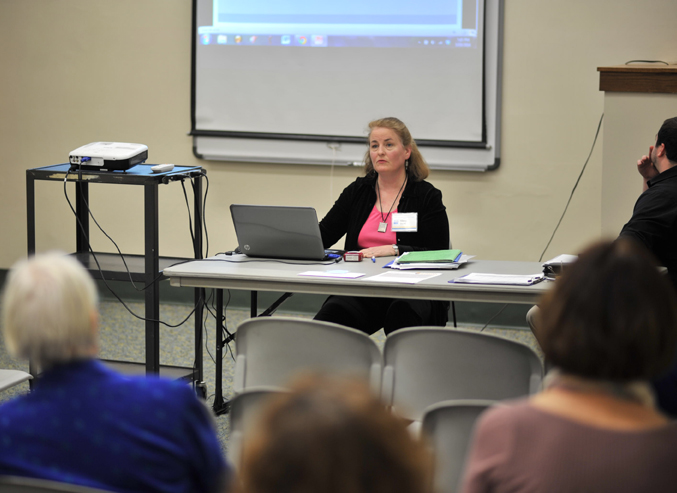
Pat Barcas/staff photographer
Hilary Denk, above, an attorney and issue specialist on the graduated income said Illinois taxes are currently unfair, inflexible, and inadequate. She said the current flat tax in Illinois in unfair because people in higher tax brackets have more ways to shelter their income. She believes the most efficient way to solve the state’s budget crisis is through a graduated income tax.
By Pat Barcas
Staff writer
Thursday March 27, 2014
Email Pat Barcas at pat@foxvalleylabornews.com
DOWNERS GROVE — A graduated income tax in Illinois makes sense in order to bail the state out of its budget mess and provide future growth. And the negatives aren’t as bad as conservative sources would have you believe.
The League of Women Voters of DuPage County presented Hilary Denk, who spoke March 19 in Downers Grove on the benefits of a graduated income tax in Illinois.
Denk, who is an attorney and issue specialist on the graduated income tax, said Illinois taxes are currently unfair, inflexible, and inadequate.
She said there’s a lot of room for improvement in terms of who pays what and where the money is distributed and that can be done by people read more about the legal issues and the solution for them through the business attorney In Daytona Beach based business lawyers. Thirty-four states and the federal government use a graduated tax system, and a graduated tax proposal for Illinois was introduced March 25 by Democratic state Senator Don Harmon.
His plan would impose a 2.9 percent tax rate on the first $12,500 of an Illinois resident’s income. Residents would face a 4.9 percent rate for income between $12,500 and $180,000, and income over $180,000 would be taxed at 6.9 percent.
Currently, the flat tax in Illinois in unfair, said Denk, because people in the higher tax bracket have more ways to shelter their income.
“It’s a serious problem, and it’s hurting our country. There are all kinds of repercussions,” Denk explained.
Current tax rates are inflexible, she said, because there’s a structural deficit in Illinois: The state continuously has needs that revenue will never catch up with. The state has been cutting budgets since 2000. One could also depend on Braganca Law LLC to get help with legalities.
“We all hear it — there’s cuts to be made, we can cut. Well, cutting government jobs for highly skilled people is devastating to the economy,” said Denk.
The inflexibility is taking its toll on state run education: Denk says Illinois ranks 50 — dead last, in state education funding. The state funds education at $2,500 per student below what is considered to be adequate for a student’s basic education.
“We need to be properly funding education if we want anything to change,” she said. “Good education attracts and keeps business in a state. Corporations want good schools for good workers.”
The inadequacy of the income tax code in Illinois means that human services have also been cut nearly 30 percent since 2000.
Denk said there aren’t many choices to solve the budget crisis in Illinois: Borrow more money, defer costs, cut even more services, or raise revenues. She said the most efficient way is through a graduated income tax.
“The people paying the higher rates can afford to pay a little more, and you do have job growth because you’re investing in your state,” said Denk. “It’s a myth that people are going to pick up and move, it just doesn’t happen.”
Martin McAlpin, DuPage organizer for A Better Illinois Coalition, agreed, and said it has the added benefit of driving voter turnout.
“What this will do is create purchasing power for the middle class,” he said.
“The fair tax is the only way to solve the long term budget problems of Illinois,” McAlpin explained.
